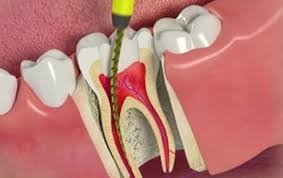Root Canal Treatment - Abu Dhabi - Dubai
Root canal treatment, also known as endodontic treatment, is a dental procedure performed to treat an infected or damaged tooth pulp. The tooth pulp is the soft inner part of the tooth that contains nerves, blood vessels, and connective tissue. When the pulp becomes infected or injured, it can cause severe pain and lead to further complications if left untreated.
Here are the key points to know about root canal treatment:
- 1. Indications: Root canal treatment is typically recommended when the tooth pulp becomes infected due to deep decay, a cracked or broken tooth, repeated dental procedures on the tooth, or trauma to the tooth.
- 2. Procedure: The root canal procedure involves removing the infected or damaged pulp from the tooth. The dentist or endodontist (a specialist in root canal treatments) will make a small access hole in the tooth to reach the pulp chamber and root canals. The infected pulp is then carefully removed, and the canals are cleaned, shaped, and disinfected. The canals are then filled with a biocompatible material called gutta-percha to seal them and prevent further infection. In some cases, a dental crown may be placed over the treated tooth for added protection and strength.
- 3. Anesthesia: Local anesthesia is administered before the procedure to ensure that the area around the tooth is numb, minimizing any discomfort during the treatment. Patients may also receive medication to help them relax during the procedure if needed.
- 4. Post-treatment care: After a root canal treatment, it is common to experience some sensitivity or discomfort, which can be managed with over-the-counter pain medications. It is important to follow good oral hygiene practices, including regular brushing, flossing, and visiting the dentist for check-ups. Avoiding hard or sticky foods and chewing on the treated tooth until it is fully restored is also recommended.
- 5. Success rate: Root canal treatment has a high success rate in saving infected teeth. It allows for the preservation of the natural tooth structure and restores normal biting and chewing functions.
If you are experiencing tooth pain or suspect that you may need a root canal treatment, it is essential to visit a dentist as soon as possible. They will evaluate your specific condition, conduct a thorough examination, and determine if root canal treatment is necessary. Early intervention can help prevent the spread of infection and potentially save the tooth from extraction.

